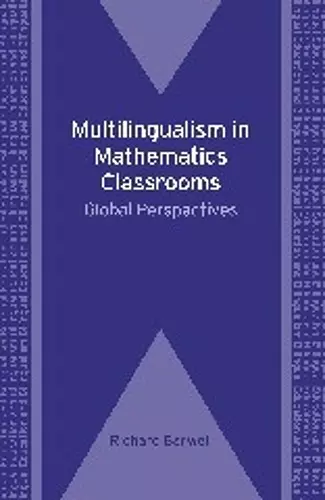Multilingualism in Mathematics Classrooms
Global Perspectives
Format:Paperback
Publisher:Channel View Publications Ltd
Published:15th Sep '09
Currently unavailable, and unfortunately no date known when it will be back

Mathematics classrooms are increasingly multilingual, whether they are found in linguistically diverse societies, urban melting pots or planned bilingual programs. The chapters in this book present and discuss examples of mathematics classroom life from a range of multilingual classroom settings, and use these examples to draw out and discuss key issues for the teaching and learning of mathematics and language. These issues relate to pedagogy, students’ learning, curriculum, assessment, policy and aspects of educational theory. The contributions are based on research conducted in mathematics classrooms in Europe, South Asia, North America and Australia. Recurring issues for the learning of mathematics include the relationship between language and mathematics, the relationship between formal and informal mathematical language, and the relationship between students’ home languages and the official language of schooling.
The book adds significantly to the scholarly literature on linguistic diversity issues in mathematics education. This book also succeeds in capturing the powerful learning environments that teachers are intuitively creating, by analyzing classroom social interactions. This book will appeal to mathematics educators, teacher candidates, and researchers who are concerned with mathematics learning and teaching in multilingual classrooms. Also, this book will provide insights into second language educators, teacher candidates, and researchers who are interested in second language learning in content areas. The authors successfully described the complexity of teaching mathematics to linguistically diverse learners with the intent of sharing these insights with the international community of teachers and researchers who are concerned with multilingualism as a whole.
-- Miwa Takeuchi, Ontario Institute for Studies in Education of the University of Toronto, Canada, Canadian Journal of Science, Mathematics and Technology Education, 10:2The editor has astutely provided some of us who regard mathematics as a challenge with a book worth reading. The editor has collected a set of chapters which renders it possible to feel like an expert of a field one doesn't know about. It is this confidence and intellectual conceit which of course is a necessary step in a development of and not the closure of expertise in this important field.
* Sinfree Makoni. *This timely book will greatly interest anyone seeking a better understanding of teaching and learning mathematics in linguistically diverse contexts. Researchers and educators of both mathematics and languages will find resources and inspiration in each chapter.
* Prof. Mamokgethi Setati *The book does indeed provide an overview of interesting and important work that has been done by those who have initiated and developed research based on and in mathematics classroom practice; on the mathematics register, and on curriculum and policy...As a review of research and an elaboration of this for practice, it is, as I have said, a valuable resource for new researchers and practitioners. Jill Adler University of the Witwatersrand, South Africa and King’s College, London, UK
* Research in Mathematics Education, 12: 2, 165-174 *Not only does it provide insights into the nature of mathematical thinking in a socio-linguistic context, but it also provides countless ideas for developing classroom practice, and opportunities to reflect on the nature of the dialogue bilingual learners need to extend that mathematical thinking. Catharine Driver, Cambridge Education @ Islington
* NALDISBN: 9781847692047
Dimensions: 234mm x 156mm x 11mm
Weight: 315g
200 pages